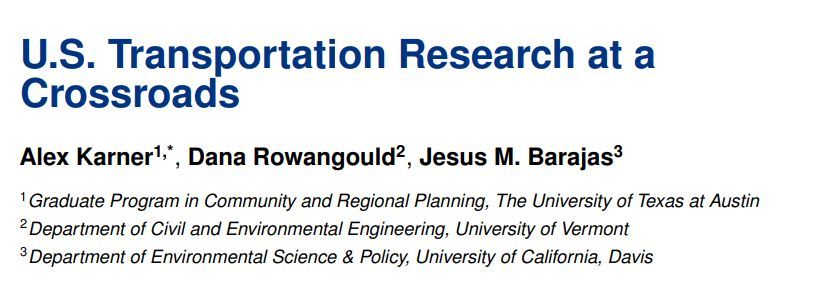Alex Karner
@alexkarner.bsky.social
1K followers
130 following
110 posts
associate professor//community & regional planning. mobility justice, transportation equity, civil rights, environmental justice, accessibility, GIScience, etc. views my own.
Posts
Media
Videos
Starter Packs
Alex Karner
@alexkarner.bsky.social
· Aug 19
Alex Karner
@alexkarner.bsky.social
· Jul 30
Alex Karner
@alexkarner.bsky.social
· Jul 30
Alex Karner
@alexkarner.bsky.social
· Jul 30
Alex Karner
@alexkarner.bsky.social
· Jul 30
Reposted by Alex Karner
Prisonculture
@prisonculture.bsky.social
· Jun 25
Reposted by Alex Karner
Kea Wilson
@keawilson.bsky.social
· Jun 25





![Abstract with highlighted text as follows:
Science in the United States has become increasingly politicized, with a wave of recent federal grant terminations and censorship of equity and climate-related work. U.S. transportation research has not been immune. [begin highlight] The Transportation Research Board (TRB), a stalwart of U.S. transportation research, has canceled research contracts, undertaken a dramatic internal restructuring, and appears poised to censor research presented at its marquee annual meeting. [end highlight] These shifts are significant in part because TRB espouses the values of scientific objectivity, independence, and integrity. Accordingly, TRB has historically funded work identified as needed by the broader research community and has been a home for the free and open exchange of ideas at its conferences, meetings, and events. [begin highlight] We argue that TRB’s recent actions suggest that it is no longer able to act with scientific integrity. [end highlight] In this commentary, we provide a brief history of TRB and its objectives, discuss its recent actions, and propose paths forward for researchers and practitioners interested in pursuing equity, justice, and climate change-oriented work.](https://cdn.bsky.app/img/feed_thumbnail/plain/did:plc:4d6lz4wh4xbbztf7it7ainxs/bafkreigoazfjkfuhcelkdartvxoezl2gejnkrcevztwinhvk72lcqk6sry@jpeg)
